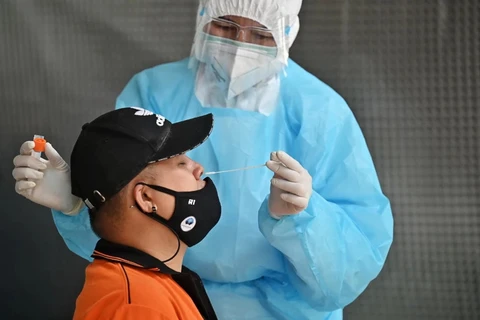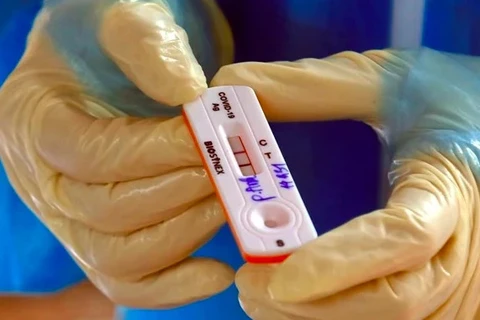HCM City (VNA) – The Ho Chi Minh City Department of Health reported on January 24 that the city's infectious disease surveillance system has detected the emergence of sub-variant JN.1 of the SARS-CoV-2 coronavirus in hospitalised patients in December last year in the locality.
JN.1 is a sub-variant from the BA.2.86 variant of Omicron classified by the World Health Organization (WHO) as a "variant of Interest” (VOI), which is the cause of the increasing number of cases and deaths in some countries.
According to data from the Ho Chi Minh City Centre for Disease Control (HCDC) from December 18, 2023, to January 22, 2024, local hospitals treated 94 COVID-19 cases from the city and several adjacent localities. Among the in-patients, 17 severe cases require supplemental oxygen. All the severe cases involve individuals in the high-risk group with serious underlying diseases, and have not been vaccinated with enough COVID-19 vaccine doses following instructions from the Ministry of Health.
Notably, the number of hospitalised cases at the Ho Chi Minh City Hospital of Tropical Diseases due to the pandemic has increased in the last six weeks.
The municipal Department of Health said the JN.1 sub-variant appeared in the city after the US Centres for Disease Control and Prevention (US CDC) reported it as the fastest growing variant and dominate in the US in December last year.
In December 2023, nearly 10,000 deaths from COVID-19 were reported worldwide while the number of hospitalised cases surged 42% from the previous month. New variants of the SARS-CoV-2 coronavirus have continuously mutated, and sub-variant JN.1 is spreading rapidly around the globe, according to WHO.
In Vietnam, the northern region is now in the transitional period between winter and spring, when cold and dry weather is alternated with wet weather, triggering infectious diseases, especially respiratory ones.
It warned that the coming Lunar New Year (Tet) holidays and spring festive season, when trading and travel demand surges, along with abnormal weather changes are favourable conditions for diseases to spread, particularly among children with weak immunity and the elderly with comorbidities, who are more vulnerable to infectious diseases.
The municipal Department of Health advised residents to take measures to protect themselves, their families and the community, including wearing a mask in medical facilities and crowded places or when having respiratory symptoms, regularly washing hands with soap or hand sanitiser, and rinsing mouth and throat with mouthwash.
People, especially those in at-risk groups, are recommended to get booster shots against COVID-19./.
JN.1 is a sub-variant from the BA.2.86 variant of Omicron classified by the World Health Organization (WHO) as a "variant of Interest” (VOI), which is the cause of the increasing number of cases and deaths in some countries.
According to data from the Ho Chi Minh City Centre for Disease Control (HCDC) from December 18, 2023, to January 22, 2024, local hospitals treated 94 COVID-19 cases from the city and several adjacent localities. Among the in-patients, 17 severe cases require supplemental oxygen. All the severe cases involve individuals in the high-risk group with serious underlying diseases, and have not been vaccinated with enough COVID-19 vaccine doses following instructions from the Ministry of Health.
Notably, the number of hospitalised cases at the Ho Chi Minh City Hospital of Tropical Diseases due to the pandemic has increased in the last six weeks.
The municipal Department of Health said the JN.1 sub-variant appeared in the city after the US Centres for Disease Control and Prevention (US CDC) reported it as the fastest growing variant and dominate in the US in December last year.
In December 2023, nearly 10,000 deaths from COVID-19 were reported worldwide while the number of hospitalised cases surged 42% from the previous month. New variants of the SARS-CoV-2 coronavirus have continuously mutated, and sub-variant JN.1 is spreading rapidly around the globe, according to WHO.
In Vietnam, the northern region is now in the transitional period between winter and spring, when cold and dry weather is alternated with wet weather, triggering infectious diseases, especially respiratory ones.
It warned that the coming Lunar New Year (Tet) holidays and spring festive season, when trading and travel demand surges, along with abnormal weather changes are favourable conditions for diseases to spread, particularly among children with weak immunity and the elderly with comorbidities, who are more vulnerable to infectious diseases.
The municipal Department of Health advised residents to take measures to protect themselves, their families and the community, including wearing a mask in medical facilities and crowded places or when having respiratory symptoms, regularly washing hands with soap or hand sanitiser, and rinsing mouth and throat with mouthwash.
People, especially those in at-risk groups, are recommended to get booster shots against COVID-19./.
VNA
























